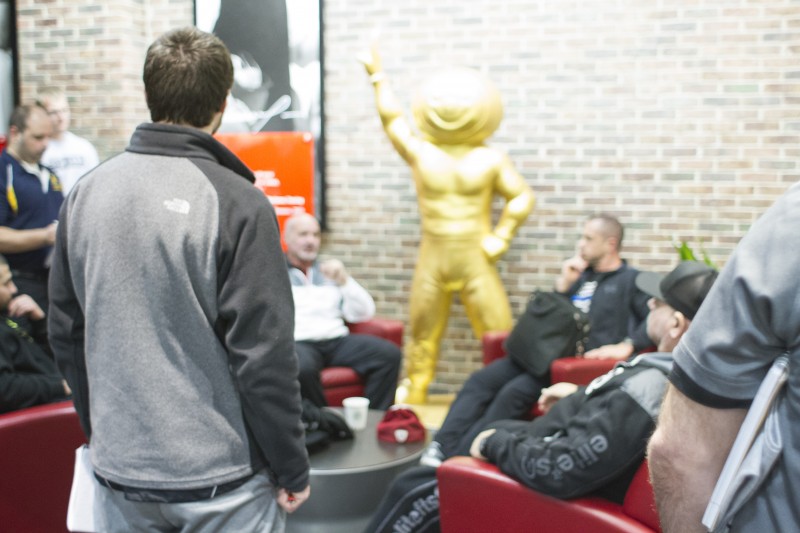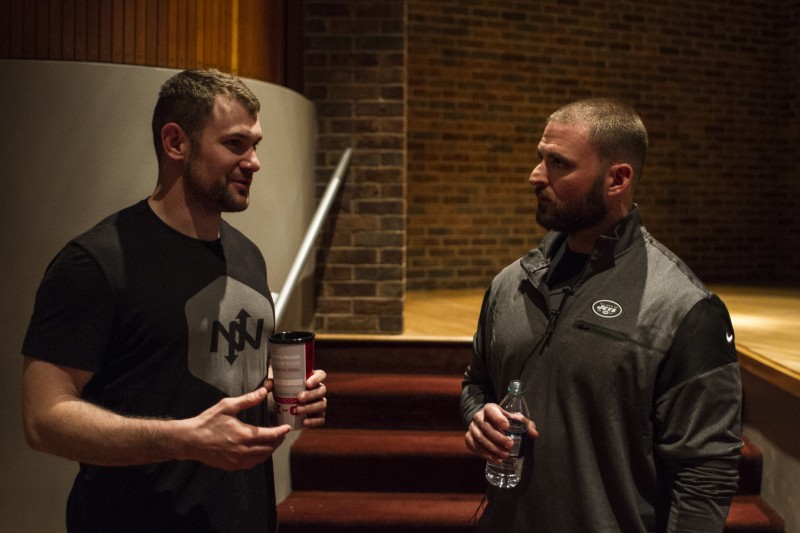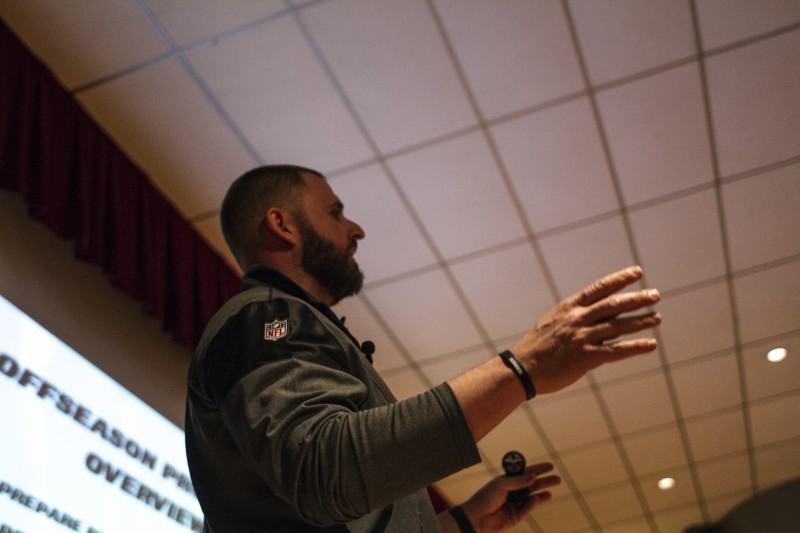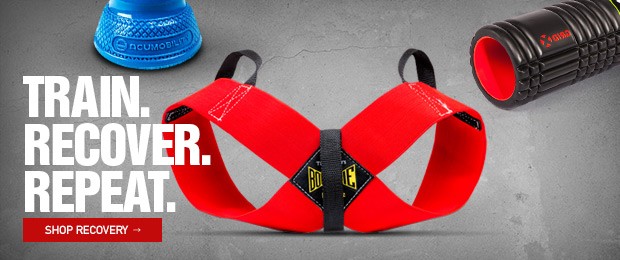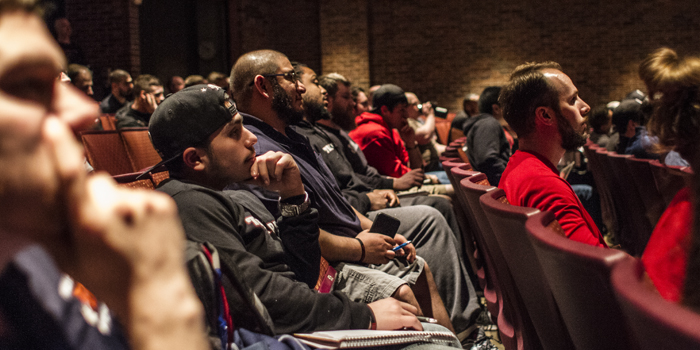
In sports performance, everyone wants to be an expert. Working with athletes is the “sexy” thing to do. Personal trainers and strength coaches want to train them, reporters want to write or comment about them, and healthcare professionals want to fix them. As everyone is well aware, a profession in anything related to sports is one of the most sought-after careers in today’s society. Regardless of what industry you work in, just being able to say your job has an association with a professional or NCAA team makes it seem to have higher importance. The notion, “If it's good enough for an elite athlete, it’s good enough for you,” seems to validate one’s quality as a professional or product. If you use the same deodorant as Shaq, you must have the best deodorant on the market, because only the best deodorant is good enough for Shaq’s armpits.
RECENT: RPR: Wake Up Your True Performance Potential
There is also a perception that in order to be seen as intelligent or an expert, you have to beat your drum a bit. That you need to come up with a new method of healing or training athletes or dismantle another individual or method to validate yourself. This seems to just lead to a lot of confusion and misinformation in the sports performance industry (whether it be health care professionals, strength coaches, or product sales). A lot of this reinvention and misinformation comes from individuals from my age group of the market (young professionals who are fresh out of school or have been in their industry for fewer than five years). Perhaps this is a new phenomenon, or perhaps I perceive it this way because I am constantly surrounded by it as a member of this younger group of professionals in sports performance. Either way, there couldn’t be a worse way for how to build your expertise than this method. The real answer is that sometimes you need to shut up, take a seat in the back of the room, and learn before you are ready to lead from the front.
Surround Yourself with and Learn from Other Experts
The first step in learning from the back is to get into a room of people that’s actually worth being in. Go to seminars, train, intern with, or read material from individuals that have knowledge you can benefit from. Build a group of mentors or trustworthy individuals and learn from their experiences. The best way to grow more quickly and make up for the fact that you are young and inexperienced is to learn from those who do have experience and learn as much as you can from their experiences. Why is it that the experts you respect always seem to have an answer for every situation or question? It’s because they are likely speaking from experience. As a young professional, it may seem like wizardry, but in reality, it’s probably because they have been doing what they do long enough that they’ve seen that situation enough times to actually have enough information to be able to weigh in on it.
Ever heard the phrase, “If I had known then what I know now”? At some point in time, everyone started somewhere. So do yourself a favor and learn the things that other experts wish they knew when they were in your position years ago. Most experts provide content to help others improve themselves, not to boast about how much they know. Chances are, if you just pay attention, the knowledge you need the most is the same information that gets hammered over and over again. Follow their work, reach out, bounce your ideas or concerns off of them, or even build a direct relationship with them.
WATCH: Dr. Eric Serrano SPS Presentation — Factors that Influence Diet and Q&A
The funny thing about learning is that regardless of the level on the expert totem pole, everyone is learning from someone or something. Even though your mentor is speaking from a point of expertise at the front of your room, they are probably in the hallway afterward, chatting with other experts to try to learn from them as well. If not, they may not be an expert for long. So how else can you let these mentors guide your journey? Find out what sources they obtained their knowledge from and follow those works. If research is your thing, take a look at some of your trusted experts’ own research to help guide your learning. If you are trying to learn about rehabilitation techniques, start with articles published by a reputable individual, and let their work branch your learning outward. Every research article is usually based off 20, 40, or even 100 other articles, which are cited at the end. Pick a few that are relative to what you want to learn and go from there. Not only are you learning something relevant to your interests, but you’re also gaining insight on sources whose information was valuable enough to the expert you’re following that they used it to support their own work. One article could lead to 30 more worthwhile articles. This is a great way to direct your learning and discover new mentors to add to your room of influence.
Evolve with Your Knowledge
One of the best reasons to learn from the back is being able to enjoy a wide view of everything going on. Metaphorically, what this means is that you learn to objectively spot bullshit better. One of the biggest mistakes that I've seen from younger professionals is developing a “first love” for a certain person, methodology, or way of thinking, and following it almost religiously. This is dangerous because instead of building their core values and beliefs and objectively observing themselves and others, they become locked into a way of thinking and close their minds to future possibilities and opportunities to learn. The entire purpose of gaining new knowledge is to advance your thinking and understanding. As you learn to be critical and continue to take in more information, your approach should evolve with time. Chances are, in 10 years you will look back at the way you used to train, treat, or approach scenarios, and see things from a different light.
Let’s say you are a strength coach, and through the process of learning from your own experiences and the experiences of others, you identify a better way to improve your athlete’s strength or speed. As you continue this critique and application of knowledge over time, your training program may drastically change from where it used to be. This doesn’t mean you should look back and feel as if you did a disservice to those athletes under your original program. Rather, you should understand that you were giving them the best program possible with the information you had at the time. What would be a disservice is having the exact same program and methods 10 years from now with your athletes, and ignoring new knowledge just because what you do instead “worked in the past.”
Another distinction that should be made is that by building your knowledge, you should continue to shape or reinforce the foundations and values of your core model of business, training, or treatment. My core values as a health care professional are to treat all of my patients as athletes and utilize performance measures relative to their age, goals, and lifestyle as a standard in which to measure their progress. Perhaps my performance standards for a particular patient demographic change in 10 years, but my core foundation to push my patients to be able to increase their ability to perform movements and tasks at work, home, or in daily activities will not.
While learning from the back, I’m not advocating the need to question every little thing, but it is beneficial to be able to step back and make sure that information being fed to you still aligns with the knowledge you have worked so hard to develop. For the most part, there isn’t really a huge wave of new scientific information that drives change in sports performance. Instead, it is typically changing the application of the knowledge we already have, along with a few new bits of science, that drives sports performance. Knowledge is great, but it still needs to be applied. It is the application of knowledge and the thought process behind that application that will make an individual stand apart.
WATCH: Buddy Morris SPS Presentation — The Mission and Purpose of an S&C Program
Finally, don’t allow someone’s credentials or seniority out-position you if they are producing information you know to be incorrect. You don’t need decades of experience in an industry to recognize bullshit. I have a rule that I will always give someone the time of day to speak and be heard, but that doesn’t mean that I walk away from the conversation being swayed or agreeing with their position if their position is false. The letters behind someone’s name do not immediately validate their message and enshrine them as an expert. You still need to listen to the reason and information behind their message to analyze its validity. I know plenty of chiropractors, physical therapists, strength coaches, and medical doctors to whom I hold equally high in regards to their knowledge. That’s what is so great about the amount of sharing and learning across professions involved in sports performance right now. These individuals are more concerned about learning and knowledge they can give to or receive from others than where someone received their formal schooling. Those people are who you want to be in the room with — the people who are more concerned about knowledge than credentials. Building your ability to remain objective will allow you do find those individuals.
You Have Not Arrived — And You Probably Never Will
The biggest thing young professionals should understand, and one of the best lessons that learning from the back can teach, is that you have not arrived and that you probably never will. Learning and growing as a professional in sports performance (and many other professions) is not a race. There is no finish line. There is no arbitrary point that you arrive at where the clouds part, you’ve accumulated sufficient knowledge, and life becomes effortless. Whether you like it or not, this is the reality. If you are looking to evolve as one of the top members of your field, beware: You are not running a race.
That’s okay. I’d rather not run.
Let’s say after five years of learning from the back, you begin to migrate closer and closer to the front. Maybe you are even the one leading from the front and educating those young, inexperienced individuals sitting in the chairs in the back that you once occupied. You’ve made it, right? You’ve arrived!
Wrong. Just as the high school or college senior thinks they finally have it figured out, it’s its time to make the leap to the next level. The enemy of great is good, and if you find yourself leading at the front of the room, it is now time for you to up the ante and find your seat in the back of the next room to continue pushing your knowledge and expertise. Maybe you still want to spend some time in that first room helping others learn and grow, but much like the big fish in a small pond, you need to join other, bigger fish to continue to grow.
If you are an individual seeking perfection or expertise, there is never an endpoint. You can see examples of this across all industries and sports. Name an athlete, profession, company, etc., that is not constantly focused on improvement and development in order to stay at the top of their trade. I promise you they do not exist. This is probably the biggest reason why there is a spectrum of people in every profession. Not everyone will be the top in their field or a world record holder. It's just not realistic. Those positions, records, and levels of expertise are unique because of the fact that they are difficult to obtain. So what makes those people stand apart? What do you do if there is no finish line? This is where passion and consistency come in.
You need to have a certain level of passion towards your field. It doesn't mean that you have to love every second of it, but it does mean that you have to feel strongly about what it is you do and how you do it. Passion is what will push you through hardships, guide your decision-making, and entice and excite you and others to your cause. Consistency is also a huge factor in building success over time. You can only go nose to the grindstone for so long before you burn out. So if you absolutely must to think of this process as a race, think of it as a life-long race. If you really want to last, you better not sprint the first leg. Sometimes, you need to trust that the consistency of chipping away will yield better results in the long run over devoting huge chunks of time and effort towards a short term goal.
Slow down, Forrest…
Time can be a positive or negative factor. If you allow time to slip by without accomplishing tasks and pushing them aside to "do it tomorrow,” it can be your worst enemy. I had an instructor in my schooling who was an incredibly intelligent radiologist and pathologist. I remember him once talking about the two years he spent studying the hand in order to master diagnosis, imaging, cause (etiology), and treatment of hand pathologies. TWO YEARS! Many people struggle changing their diet and exercise regimen even when their life is at stake for this amount of time. Even in the strength and performance industry, you will only find a certain percentage of individuals who have devoted two years to bring up their weaknesses in the pursuit of furthering themselves.
Consistency is defined as “the ability to achieve a level of performance which does not vary greatly in quality over time.” If you looked at the relationship between total performance, time, and consistency (consistent performance) as a mathematical equation:
Performance (Total) = Consistent Performance x Time
As consistency is a fixed variable by definition, you can see that the biggest factor in total performance is time. The longer you are able to maintain that consistency the more performance, growth, and success you will have. Routines, methods, and goals built into each day, week, month, etc., are great ways to accomplish this. If you are able to utilize consistency and accomplish tasks and improve each day, time will compound and multiply this growth over a long period.
The big takeaway from all of this is, if you are not shortsighted and consider the entire span of a 30 or more year career, a few years is not a lot of time. The biggest lesson young professionals can learn is to understand and respect the value of time and how to use it to your advantage. This understanding of longevity will be one of the biggest factors in your success as an individual. If you use it wisely, it will pay dividends. The other cool thing about consistency and passion is they eventually become habitual. After a while, you don't so much force yourself to devote time to learning, growing the business, or building your strength because you HAVE to, but simply because it's a part of what you do and value most.
Dr. Tyrel Detweiler provides care for athletes across all sports with a majority of his experience coming from working with athletes in collegiate and strength sports. He holds a doctorate in Chiropractic and a Master’s of Science in Sports Rehabilitation. He is the owner of Mid-South Spine and Sports Performance in Cordova, TN. This facility has a unique relationship with NBS Fitness, giving him access to some of the best strength athletes in the Mid-South. He was a former member of Mizzou’s Sports Medicine Team and is currently in his second year as the chiropractic physician for the University of Memphis Athletics. Tyrel was a college football player at the University of Iowa and has competed in powerlifting and strongman since 2010. He is also the current Mississippi state representative for United States Strongman. He can be reached at drdetweiler@midsouthssp.net.









